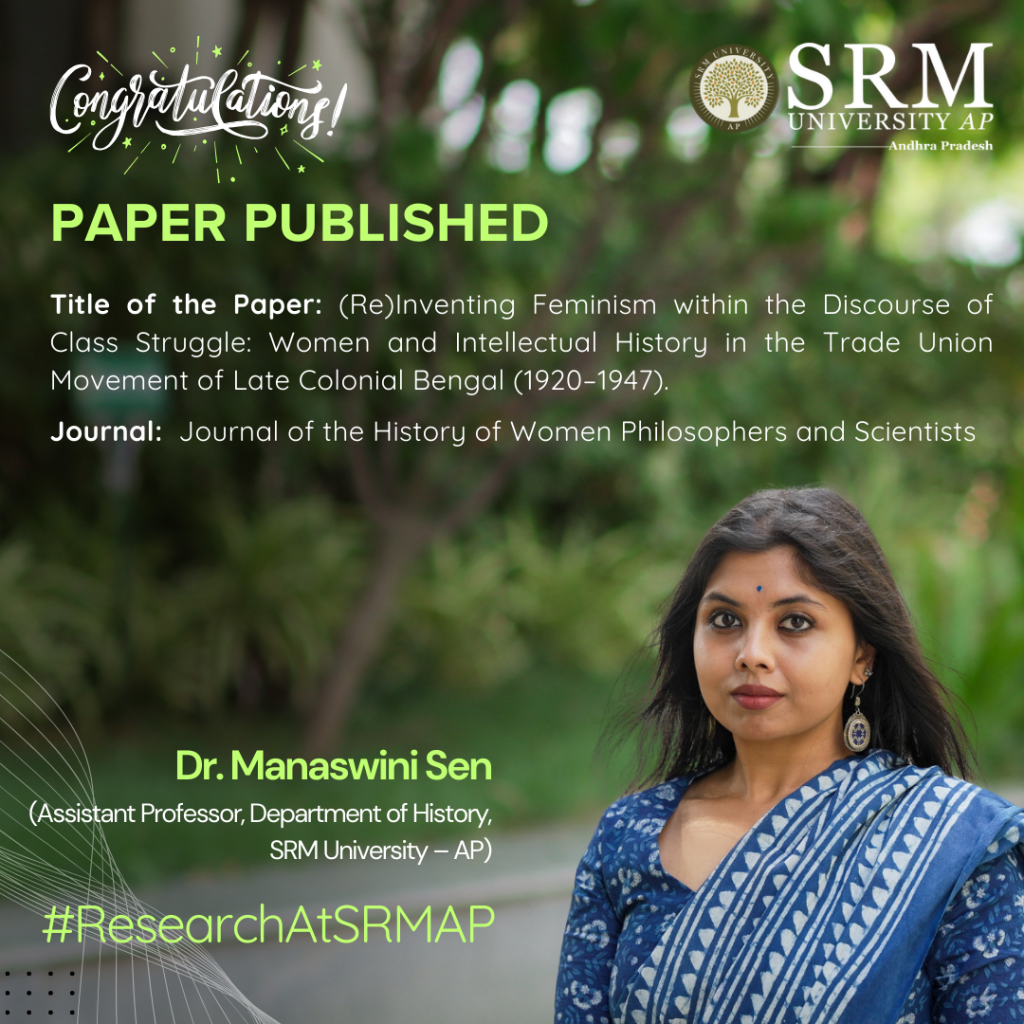
Dr Manaswini Sen, Assistant Professor at the Department of History, has published an insightful paper tracing the ideological and intellectual output of women trade unionists in late colonial Bengal. Her research paper titled “(Re)Inventing Feminism within the Discourse of Class Struggle: Women and Intellectual History in the Trade Union Movement of Late Colonial Bengal (1920–1947)”, published in the prestigious Journal of the History of Women Philosophers and Scientists, offers a novel perspective on understanding the class struggle, anticolonial discourse in the patriarchal society of colonial Bengal.
Abstract
This paper envisages (re)constructing the intellectual praxis of women trade unionists in late colonial Bengal. By arguing how political practice habitually translates to political thought, the paper devises a methodology to address the gendered discourse of intellectual history in the Global South. It focuses on intellectual output, primarily journal articles of women trade unionists like Santoshi Kumari Gupta, Maitreyee Bose, and Kanak Mukherjee, to trace a genealogy of how class struggle was perceived by women labour activists across the ideological spectrum of nationalism, socialism, and communism between 1920 to 1947 in Bengal. The piece is an effort to transcend the manifold marginalisations that plague the establishment of feminine political praxis within the regulating structures of colonialism and capitalism. In the process, it bids to unfold an alternative narrative of the anti-colonial, anti-capitalist, and anti-patriarchal narrative of the decolonisation of South Asian intellectual thought.
Research, Collaboration and Future Research Plans
The research strives to bring to the forefront the intellectual contributions of three female trade unionists in the late colonial period to trace the evolution of discourses on anticolonial class struggle from a gendered perspective. With the global turn in intellectual history, there is an augmented effort at amplifying the ‘small voices of history’. The inherent socio-cultural predicaments in our society make it inordinately challenging to trace conventional sources for mapping the intellectual endeavours of women. This paper aims to rectify this gap by reconstructing women labour activists’ intellectual practises and literary output in the early 20th century. In the process, the research tries to bring forth narratives of anticolonialism, which drowns in the overwhelming presence of nationalism in the discourses of decolonisation of South Asia. This paper was the result of academic exchanges with professors of Benaras Hindu University, Dr B.R. Ambedkar University, Delhi, and the University of Paderborn, Germany.
Dr Sen primarily researches marginal anticolonial epistemological traditions of South and South East Asia. Her thesis on the evolution and dissemination of socialism in late colonial Bengal, which focuses on an intellectual history of trade unionism, forms the basis of her first monograph. However, she is now focusing on the transnational and transcontinental intellectual networks of a wide spectrum of leftist labour activists and proto-nationalists and the ways these fringe intellectual traditions interacted with each other and nationalism. Based on a rich archive across India and Europe and a plethora of alternative sources, she tends to devise new methodological interventions in the field of Global Intellectual History, making labour history more accessible and relevant in scholarly circles.

